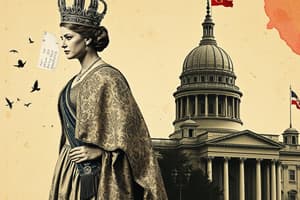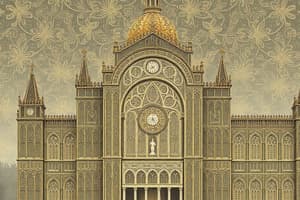Podcast
Questions and Answers
In a constitutional monarchy, what is the primary role of elected representatives?
In a constitutional monarchy, what is the primary role of elected representatives?
- To directly enforce the monarch's decrees.
- To advise the monarch on all executive decisions.
- To make laws and pass legislation. (correct)
- To serve as symbolic figureheads alongside the monarch.
Which of the following actions represents a citizen's responsibility in most monarchies?
Which of the following actions represents a citizen's responsibility in most monarchies?
- Voting in elections for representatives. (correct)
- Obeying the monarch without question.
- Having the legal right to complain about the monarch.
- Being exempt from paying taxes.
What is a key difference between an absolute monarchy and a constitutional monarchy?
What is a key difference between an absolute monarchy and a constitutional monarchy?
- In an absolute monarchy, the ruler has complete control, while in a constitutional monarchy, the monarch's power is limited by a constitution. (correct)
- Absolute monarchies are always hereditary, while constitutional monarchies are always elective.
- Absolute monarchies are more stable than constitutional monarchies.
- Constitutional monarchies do not have a royal family.
What is a potential disadvantage of a monarchy?
What is a potential disadvantage of a monarchy?
How are laws typically made in a constitutional monarchy?
How are laws typically made in a constitutional monarchy?
Which of the following is generally considered a characteristic of monarchy?
Which of the following is generally considered a characteristic of monarchy?
Which of the following is an accurate statement about monarchs?
Which of the following is an accurate statement about monarchs?
Which of the following factors determines how laws are enforced within a monarchy?
Which of the following factors determines how laws are enforced within a monarchy?
Which of the following exemplifies the structure of a monarchy comprising independent institutions?
Which of the following exemplifies the structure of a monarchy comprising independent institutions?
In a hereditary monarchy, how is the next monarch typically selected?
In a hereditary monarchy, how is the next monarch typically selected?
What distinguishes modern constitutional monarchies from absolute monarchies?
What distinguishes modern constitutional monarchies from absolute monarchies?
What role do royal decrees play in certain monarchies?
What role do royal decrees play in certain monarchies?
What is one potential advantage of a monarchy?
What is one potential advantage of a monarchy?
In what geographical areas are monarchies still prevalent in the 21st century?
In what geographical areas are monarchies still prevalent in the 21st century?
How does the succession process most commonly occur in monarchies?
How does the succession process most commonly occur in monarchies?
Flashcards
Citizen Rights & Responsibilities
Citizen Rights & Responsibilities
Rights include voting; responsibilities include paying taxes and obeying laws.
Constitutional Monarchy
Constitutional Monarchy
Citizens elect representatives, monarch is symbolic.
Absolute Monarchy
Absolute Monarchy
Ruler has complete control.
Monarchy Disadvantages
Monarchy Disadvantages
Signup and view all the flashcards
Monarchy Advantages
Monarchy Advantages
Signup and view all the flashcards
Law Creation in Monarchy
Law Creation in Monarchy
Signup and view all the flashcards
Monarchy Definition
Monarchy Definition
Signup and view all the flashcards
Hereditary Monarchy
Hereditary Monarchy
Signup and view all the flashcards
Monarch Titles
Monarch Titles
Signup and view all the flashcards
Monarch's Term
Monarch's Term
Signup and view all the flashcards
Countries with Monarchies
Countries with Monarchies
Signup and view all the flashcards
Study Notes
- Citizens in a monarchy have rights and responsibilities, including the right to vote, the responsibility to pay taxes, and the responsibility to obey the law.
- In constitutional monarchies, citizens elect representatives to make laws, while the monarch is a symbolic head of state.
- Citizens are forced to obey the monarch and have no legal right to complain.
Benefits & Drawbacks
- A monarchy is a form of government where authority resides in one individual who is the head of state.
- Absolute monarchy involves complete control by the ruler.
- Disadvantages include a lack of democracy, potential abuse of power, and the expense of the royal family.
- Advantages include stability, continuity, and tradition.
Law Enforcement
- Laws are typically made by an elected legislature, with the monarch's power limited by a constitution.
- Laws are also made by rulers through royal decrees, which also impose punishments.
- Law enforcement varies depending on the type of monarchy.
Key Characteristics
- A monarchy is a form of government where a single person, the monarch, rules as head of state with power ranging from symbolic to autocratic.
- A monarchy consists of distinct institutions: a government, a state administration, and a court.
- In hereditary monarchies, the monarch's position is usually passed down through the family.
- Monarchs are often referred to as kings, queens, emperors, or empresses.
Interesting Facts
- Monarchs can be kings, queens, emperors, or empresses.
- Monarchies are usually hereditary, with the monarch's child or relative taking over.
- Monarchies can form federations, personal unions, and realms with vassals.
- A monarchy is a system where a monarch is head of state for life or until abdication.
- The succession of monarchs in many cases has been hereditary.
Examples
- As of 2025, there are 43 sovereign states with a monarch as head of state.
- There are 13 monarchies in Asia, 12 in Europe, 9 in the Americas, and 6 in Oceania.
- Examples include Spain, Saudi Arabia, and Morocco.
- Countries with monarchies include constitutional, absolute, and elective monarchies.
- The United Kingdom is a famous constitutional monarchy with King Charles III as head of state.
- Other examples included Japan and Norway.
Studying That Suits You
Use AI to generate personalized quizzes and flashcards to suit your learning preferences.




